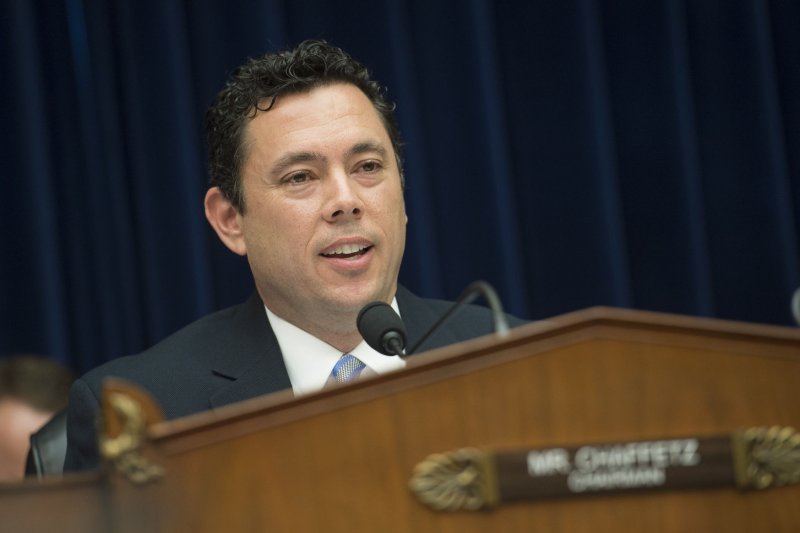Rep. Jason Chaffetz, R-Utah, chairman of the House Oversight Committee, on Wednesday said that despite being "confident I would continue to be re-elected by large margins," he will not run for re-election in 2018. File Photo by Kevin Dietsch/UPI |
License Photo
April 19 (UPI) -- U.S. Rep. Jason Chaffetz, chairman of the House Oversight Committee, on Wednesday said he will not run for reelection in 2018.
In a statement, the Republican from Utah thanked his constituents for allowing him to serve as their representative. Chaffetz entered office in 2009 and his indefinite departure from politics would leave Utah's 3rd District up for grabs.
"Serving is an honor and a privilege that I have never taken for granted," Chaffetz said in a Facebook post. "After long consultation with my family and prayerful consideration, I have decided I will not be a candidate for any office in 2018."
Chaffetz's announcement follows months of fundraising efforts by his Democratic challenger, Kathryn Allen, who has raised about $400,000 this year for a total of more than $534,000 in her campaign account. Prior to dropping out, Chaffetz raised $176,500 this year for a total of $402,700 in cash on hand for his campaign, the Salt Lake Tribune reported.
Most of Allen's donations -- 88 percent -- came from small donors who gave no more than $200 and none came from political action committees.
Chaffetz said that by leaving the race early, he will give "prospective candidates time to lay the groundwork for a successful run."
"I have no doubt the 3rd Congressional District will be represented by a Republican. I trust you to find the best person to serve," Chaffetz wrote.
Chaffetz said he will return to work in the private sector despite saying he is "confident I would continue to be re-elected by large margins."
Special elections and upcoming elections have led to speculation about whether seats in the House and Senate held by Republicans would flip to Democrats in a backlash against the election of President Donald Trump.
In Kansas, Republicans narrowly won a special election to replace the House seat vacated by former Rep. Mike Pompeo, who is now Trump's director of the CIA. Ron Estes defeated his rival, James Thompson, by about 5 percentage points in a district Trump carried with 60 percent of the vote.
Estes will represent the traditionally Republican 4th Congressional District, which encompasses Wichita and surrounding areas.
In Georgia, Democratic candidate Jon Ossoff narrowly missed winning a majority of votes in a special election to replace former House Rep. Tom Price, who is leading the Department of Health and Human Services. In the race, Ossoff won 48.3 percent of the vote in Georgia's 6th District, which has been held for decades by Republicans. A runoff election will be held June 20.
In another traditionally Republican state, Texas, Republican Sen. Ted Cruz could also face closer competition from Democrats. In a poll by Texas Lyceum, Democratic House Rep. Joaquin Castro would lead Cruz with 35 percent of support among Texas adults to 31 percent, respectively. A Democrat has not won a Senate race in Texas in 29 years.















